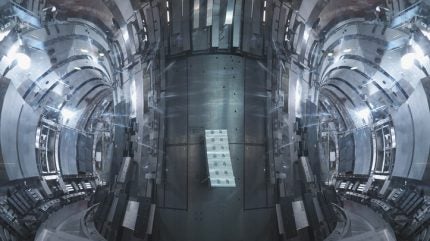
Nuclear fusion development is advancing rapidly across the world, bringing the world closer to a limitless energy source, according to a new report published by GlobalData, Power Technology’s parent company.
According to the report entitled Fusion Visionaries: Start-ups Shaping the Future of Energy, start-ups are spearheading innovations like cold fusion, superconducting magnets, laser-ignited capsules and projectile fusion, addressing the critical challenges of sustained reactions and scalable reactor designs.

Discover B2B Marketing That Performs
Combine business intelligence and editorial excellence to reach engaged professionals across 36 leading media platforms.
Kiran Raj, head of disruptive tech at GlobalData, comments: “The nuclear fusion sector is witnessing rapid growth, fuelled by significant investments and the entry of new players. Start-ups are pioneering novel reactor designs including compact spherical tokamaks and alternative magnetic confinement methods, while also navigating regulatory and safety challenges.”
According to Raj, start-ups have concentrated on overcoming fusion-specific hurdles such as achieving the extreme conditions necessary for sustained fusion reactions and creating scalable, economically viable reactors.
The report identifies Australian laser fusion company HB11 as a notable start-up revolutionising the fusion field, having recently achieved a breakthrough in nuclear fusion with a laser-driven, non-thermal method that fuses hydrogen and boron-11.
Nuclear fusion involves heating two light hydrogen nuclei to extreme temperatures, combined into a large nucleus that releases energy to be used to generate electricity. This differs from traditional nuclear fission in which a heavy nucleus is split into two larger pieces. Fusion is considered safer than fission, as the latter leaves large deposits of nuclear waste that are difficult to dispose of.

US Tariffs are shifting - will you react or anticipate?
Don’t let policy changes catch you off guard. Stay proactive with real-time data and expert analysis.
By GlobalDataThe US has also hit significant milestones to develop its industry. At the end of last year, scientists at the National Ignition Facility produced fusion reactions that generated more energy than they consumed multiple times, marking a breakthrough for the nascent technology.
The process involved firing 192 laser beams at a frozen pellet of hydrogen isotopes that sat in a diamond capsule suspended inside a gold cylinder. In the experiments, the implosion caused by the laser beam generated 3.88 megajoules of fusion energy, an 89% increase over the input energy.
“The successful integration of advanced fusion reactors into global energy grids has the potential to revolutionise energy generation and consumption worldwide,” Raj says.
On the other hand, the report expresses concern about the UK’s fusion industry as the new Labour Government has not specified its approach to the technology.
Under the Conservative’s, the UK looked to develop nuclear fusion as part of its Great British Nuclear Programme. While the newly elected Labour Government promises to use Great British Energy as a vehicle to stimulate investment in the sector and has committed to getting “Hinkley Point C over the line”, it has not come out with specific plans for fusion.
The UK Department for Energy and Net Zero did not reply to Power Technology’s request for comment.
Back in February, the UK achieved a fusion breakthrough when its JET machine achieved a new record for energy output. High fusion power was consistently produced from the 40-year-old reactor for five seconds, the UK Government said, resulting in a record 69 megajoules of energy output from just 0.2mg of fuel.
However, soon after the achievement, the JET machine was shut down. It had been predominantly funded by the EU, and the UK refused to rejoin the EU nuclear research programme, Euratom, following Brexit. Ever since, its position in the European collaboration on fusion development has remained unclear.





